La Nouvelle Revue d’Histoire est en kiosque (n°53, mars – avril 2011). Le dossier central est consacré à l’Italie, de la chute de Rome à l’unité de 1861. On peut y lire, notamment, des articles de Jacques Heers, de Michel Ostenc (« L’Eveil du Risorgimento », « Mazzini ou le nationalisme républicain ») ou de Philippe Conrad (« Napoléon III, l’acteur essentiel ») et un entretien avec Marco Perruzi, intellectuel padanien, proche de la Ligue du Nord (« Vers une partition de l’Italie ? »). Hors dossier, on pourra lire, en particulier, une analyse du dernier ouvrage de Pierre Manent sous la plume de Dominique Venner, un article de François Bousquet sur l’oeuvre de D.H. Lawrence, un entretien avec Bernard Lugan sur le Maroc et un entretien sur le populisme européen avec le conseiller national suisse Oskar Freysinger, ainsi que la chronique de Péroncel-Hugoz.
Corruption in Russia is certainly more pronounced and pervasive in its measurable forms than in the West. Bribery, extortion and theft are corrosive to the state and society at large, but importing the contemporary pathologies regnant in America and Europe is positively lethal. The alleged “transparency” of liberalism masks spiritual corruption- the inversion of virtue itself and cultural disintegration. Russians must already confront the murderous legacy of Marxism-Leninism, a vacuum filled today by anything from drug addictions to electronic entertainment and consumer distractions. To forge a path to resurgence, the new iterations of atheist materialism must be combated and vanquished rather than welcomed.
The role of Vladimir Putin in restoring Russia must therefore be examined more closely. In a number of cases, the current prime minister has vigorously prosecuted the interests of his nation; curbing the power of Open-Society tycoon Mikhail Khodorkovsky and standing up to Washington in the post-Soviet space are examples that come immediately to mind. Yet it is not clear that Putin has any overarching conservative vision for Russia. Indeed, his entire power “tandem” with Medvedev attests to absorption with tactics and expediency at best. Thus intelligent and fearless criticism from the right becomes a necessity. The words of nationalist and academic Andrei Saveliev carry special resonance in this regard. In this two-part interview with Alternative Right, Saveliev provides us an insider’s look at Russian politics and elaborates his tough and principled opposition to the liberal oligarchy.
***
Andrei Saveliev has a PhD in Political Science from Moscow State University. He was an elected deputy of the Fourth State Duma on the "Rodina" ticket (2003-7) and the right-hand man of Rodina's leader, Dmitry Rogozin. He is chairman of the unregistered political party Velikaya Rossiya (Great Russia). He is the author of over 300 articles and several books, including Political Mythology (2003), Nation and State: A Theory of Conservative Reconstruction (2005), The Image of the Enemy: Racial Studies and Political Anthropology (2007). He currently teaches courses on the Sociology Faculty at Moscow State University.
Alfred Smith is the alter ego of a graduate student somewhere in the UK. He was happy to conduct this interview and skilled translation for Alternative Right during a recent trip to Moscow. Some of his writings can be found at The Devil's Review.
Many conservatives in the West have a favourable opinion of Vladimir Putin, seeing him as true national leader who is working in the interest of the Russian people. Many of my colleagues believe him to be a conservative, even a nationalist. However, in your book Nation and State: A Theory of Conservative Reconstruction, you write that Putin is actually a liberal. How is Putin a liberal?
I was very surprised when I met with some Italian conservatives, they gave me a publication in which Putin was extolled as a great world leader, as some sort of model of a nationally oriented head of state. Their confusion had to do with the lack of information about the real situation in Russia, and the misinterpretation of certain rude words spoken by Putin, which were taken as ‘anti-American’ and quoted many times in the Western media. At the time I wrote a short explanation and sent it to the Italians.
Let us remember, for a start, that Athenian democracy made much use of slave labour, ritual prostitution and a monopoly on maritime trade, which more close resembled piracy. In ‘totalitarian’ Sparta the number of hangers-on (the city demos) was much smaller, while the relationship between the Spartans and the helots was more reminiscent of the relationship between landowner and tenant. Besides, even in Athens it was not permitted to kill a slave arbitrarily. In one of the dialogues of Socrates, his interlocutor tells how the murderer of a slave was bound and thrown into a ditch before being taken into custody.
Liberal ideas appeared and began to manifest themselves in the life of the world in the context of the slave trade and the drug trade (the Opium Wars, for example). And now formal democracy rests on various forms of slavery (including sexual), unprecedented levels of drug addiction world-wide, various forms of theft, and speculation on commodities and financial instruments, which destroys industry and agriculture through debt bondage.
As far as contemporary Russia is concerned, I judge by the results, by the way of thinking and the actions of Putin. His aims are exclusively liberal. And the results of his governance have been deplorable for the country. The crisis which Russia fell into in 2008 is still deeper than the one in the Yeltsin period, and Putin’s policies are largely to blame for this. The main cause of this crisis is the legalization of the capital obtained by the oligarchs. This was possible only under an ultra-liberal government. What this means is the pardon of enormous crimes concerning the seizure and transfer of property in previous years, during Yeltsin’s presidency. Under Yeltsin they managed to make about ten billionaires right with the law, under Putin, about a hundred.
Liberalism has various definitions. The main mark of contemporary liberalism is not the demand for freedom of enterprise, but the globalisation of the economy and the de facto liquidation of national sovereignty. Free elections and parliamentary debates are only the façade of the political system. In Russia this façade looks filthy and absurd, but the basic blueprint, accepted in the West, has been preserved. There are no real elections, no real debates. But there are semblances of them. More important is what is behind the façade. What’s behind it is the absolute power of the oligarchy and a corrupt bureaucracy, which is ripping the country to pieces.
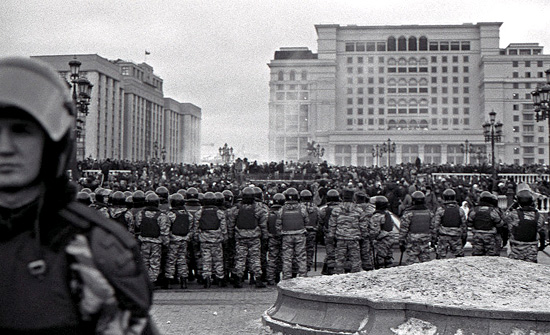
Putin is representative of those power groups who have transformed the Russian economy into a part of the global economy, who have changed the economy such that it no longer serves the national interest. The oligarchic order which has developed in Russia was created by the experience and the pressures of the global economy, which is promoted by unaccountable people who have no fatherland. This is not small or medium sized business – this is big business, global business which has penetrated into other countries and integrated itself with similar global businesses: Gazprom, Lukoil, Rosneft etc. These are the main fuel and energy corporations. But that’s only the beginning of what they do. They have become involved in other arenas, including politics. Their interests are in no way connected to Russia’s national interests. The interest these corporations have in Russia is to use the energy resources of the country in such a way that the Russian people will not gain any benefit from them.
The second aspect of liberalism which is relevant to our country is the formation of a liberal (that is, free from any and all responsibility) bureaucracy. This bureaucracy has basically become its own social class. It’s not only civil servants, it’s a class formed by familial ties and ethnic solidarity which is opposed to the ethnic Russian majority. This is something else we can thank Putin for. And for the ‘iron law of oligarchy’ which in this case met with no resistance from our government: any democratic system degenerates into oligarchy. In this case we see the highest officials included in the oligarchy and the formation of civil service that acts as a mechanism for the suppression of civic consciousness. Liberalism in this environment is an ideology meant to keep citizens on a short leash. It has replaced the communist ideology, employing the same form of rhetoric, and differing only in its terminology. In the Putin bureaucracy we see not fidelity to law and national interests, but the conviction that one has the right to be arbitrary and flout the law.
Putin in this matter is a perfect model: he ignores the law both as an administrator (constitutional norms are unknown to him, and of no interest), and as a politician, constantly showing off before the whole country. The sanctions of law that are supposed to be common to all do not apply to him. He is like a driver who gets away with breaking all the traffic rules. His cynical flouting of the law is censured only by independent online journalists. Putin provides the model for all the local bureaucrats. Behind the façade of formal obedience to the law they conceal their complete contempt for law. This is their understanding of freedom: freedom to be independent of the law. But with the option of forcing citizens to follow the most absurd and illegal rules.
The liberal bureaucracy has transformed Russia into an open hunting zone, a wild west, where a few are allowed to hunt, and the rest to either observe or become the prey. All the rest must live strictly in accordance with the law and go to the bureaucrat to ask his permission for anything they wish to do. The bureaucrat, for his part, may act in accordance with the law, or may not act at all. And this pernicious inaction on the part of the bureaucrat is his main tool of manipulation and taking bribes.
Yet another aspect of the liberalization of Russia under Putin is the mass media, where the level of pornography has exceeded all bounds, while the reliability and completeness of information has ceased to be a priority. State television promotes freedom from restraint, free love, homosexuality, prostitution, slovenliness, ignorance and cynicism. And all of this is under the auspices of the government, which demands only complete loyalty to the regime. In the rest of the media, the most depraved and dissolute people are allowed to run things.
Putin has not carried out a single project, though he had at his disposal such a colossal sum of money as no ruler in the world ever had. It all went into the pockets of the oligarchs. And now that the oil prices have gone south, it turns out that the electronic credits Russia received as payment for oil and gas are worthless. Now we lack the resources to provide for a more or less decent standard of living for the vast majority of the population, let alone for modernization.
Putin has committed a series of criminal acts to kow-tow to the liberal world community. He has handed over the lion’s share of Russian firms to foreign capital and the deracinated oligarchy, ceded vast territories to China, abandoned the Northern Caucasus (especially Chechnya) to criminality, and destroyed close relations with Ukraine and Belarus using ‘gas blackmail’. The harsh grimaces of this actor should not deceive us. It is no more than an act.





 del.icio.us
del.icio.us
 Digg
Digg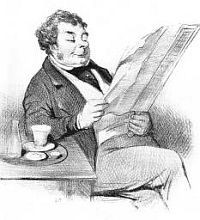



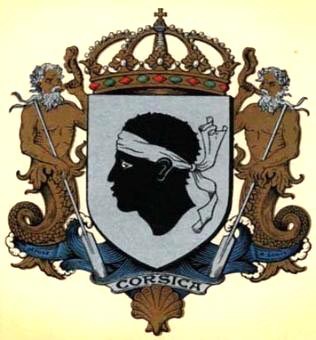 BREIZATAO – CORSICA (19/02/2011) L’IFOP a publié en 2008 une étude très intéressante sur les glissements politiques en cours en Corse au sein de la mouvance nationaliste. Constat le plus frappant: la nouvelle génération se tourne résolument vers un nationalisme de droite affirmée.
BREIZATAO – CORSICA (19/02/2011) L’IFOP a publié en 2008 une étude très intéressante sur les glissements politiques en cours en Corse au sein de la mouvance nationaliste. Constat le plus frappant: la nouvelle génération se tourne résolument vers un nationalisme de droite affirmée.

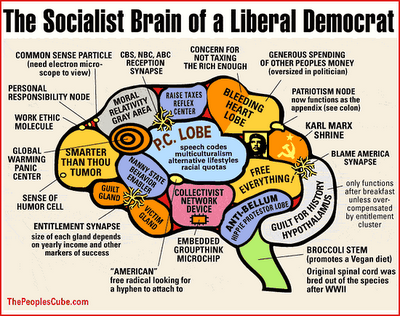
 L’ONU a disposé de témoignages précis dès 2003, sur un possible trafic d’organes organisé au Kosovo, en Albanie et dans d’autres pays étrangers, depuis l’immédiat après-guerre jusqu’en 2000.
L’ONU a disposé de témoignages précis dès 2003, sur un possible trafic d’organes organisé au Kosovo, en Albanie et dans d’autres pays étrangers, depuis l’immédiat après-guerre jusqu’en 2000.

 Carl Schmitt’s short book
Carl Schmitt’s short book 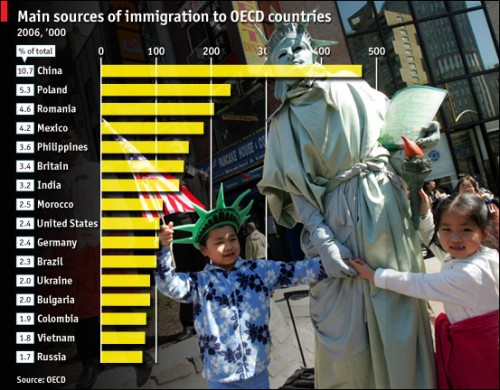
The Culture of Critique & the Pathogenesis of Modern Society
Ex: http://www.counter-currents.com/
Reinhart Koselleck
Critique and Crises: Enlightenment and the Pathogenesis of Modern Society
Cambridge: MIT Press, 1988
La politique, c’est le destin. — Napoleon
Koselleck’s Critique and Crisis (1959) is one of the great dissertations of the 20th-century German university system.
It cast new light not just on the past it re-presented, but on the present, whose own light informed its re-presentation.
This was especially the case with the potentially cataclysmic standoff between American liberalism and Russian Communism and the perspective it gave to Koselleck’s study of the Enlightenment origins of the Modern World.
How was it, he asked, that these two Cold War super-powers seemed bent on turning Europe, especially Germany, into a nuclear wasteland?
The answer, he suspected, had something to do with the moralizing Utopianism of 18th-century rationalism, whose heritage ideologically animated each hegemon.
1. The Absolutist Origins of the Modern State
Koselleck was one of Carl Schmitt’s postwar “students” and his work is indebted to Schmitt’s The Leviathan in the State Theory of Thomas Hobbes (1938).
Like his mentor, Koselleck saw modern ideologies, despite their atheistic rejection of faith, as forms of “political theology” that spoke to the faith-based heart that decides how one is to live.
In this sense, the self-proclaimed Enlightenment of the 18th century was a philosophical rebuttal to political Absolutism, whose institutional response to the breakdown of medieval Christendom occurred in ways that frustrated the liberal aspirations of the rising bourgeoisie.
In the century-long blood-letting that had followed the Protestant critique of medieval Catholicism, Europe’s ecclesiastical unity and its traditional social supports were everywhere shattered.
As the old estates broke down and old ties and loyalties were severed, there followed a period of anarchy, in which Catholics and Protestants zealously shed each others blood in the name of their contending truths.
In this sectarian strife — this bellum omnium contra omnes — where ecclesiastical authority ceased to exist and each man was thrown back upon his individual conscience, morality became a banner of war and the public observance of morality a justification for murdering Europeans with dissenting beliefs.
It was the advent of the Absolutist State system, philosophically anticipated in Hobbes’ Leviathan, that brought these bloody religious conflicts to a halt, establishing a peaceful basis to European life — by “privatizing” morality, secularizing authority, and depriving individual mentalities of political effect.
The neutralization of religious belief that came with the Absolutist secularization of the State would secure conditions requisite to the citizen’s peaceful pursuit of his private will or gain, as private ideals ceased to be obligatory duties and the State became “the artifact of atomized individuals.”
Absolutist regimes succeeded in this way in “reducing measures of contingency, conflict, and compulsion” to the status of differences of opinion — bare, in effect, of religious significance, as “external compulsion” imposed restraints on the individual’s “inner freedom.”
The historians’ designated Age of Absolutism and Enlightenment begins, then, with the Peace of Westphalia in 1648, which brought not just the Thirty Years War in the German-speaking lands, but all Europe’s religious wars to an end (except on the borderlands of Ireland and the Balkans) — and ends only with the advent of another European civil war, which opened with the liberal revolutions of 1776/1789 and closed with the English triumph over Napoleon in 1814.
History, though, rarely conforms to the tidy categories scholars make of it.
Unlike the Continent, England went from religious war to Absolutism and then to bourgeois revolution and finally to a bourgeois Restoration all in the course of a half-century (c. 1642–1688), experiencing an intense though only brief period of Absolutism.
England’s expanding maritime power, opened to all the world it dominated, had, in fact, merely a transitional need of Absolutism, for it would soon become the first implicitly liberal of the “modern” regimes.
Koselleck focuses on the longer, more pronounced Continental developments, treating England as a variant of the larger trend.
In his depiction, the Absolutist State system emerging after the Treaty of Westphalia was based on a transformation of political authority — which divided the “public sphere” into two sharply separate domains: That of political authority proper (the sovereign State) and that of society, conceived as a subaltern realm of individual “subjects.”
The subject’s moral conscience in this system was subordinated to the requirements of political necessity — what Hobbes called “reason.” This restricted morality to the social realm of private opinion, depriving it of political effect.
With Absolutism, the public interest, about which the sovereign alone had the right to decide, ceased to lay under the jurisdiction of the individual’s moral conscience.
The Continent’s new monarchical States — with Louis XIV’s France the model of the others — would govern according to a raison d’état (Staatsräson), which made no reference to religious considerations.
Law here was severed from special interests and religious factions, becoming part of a domain whose political decisions — ideally — transcended “Church, estate, and party.”
“To traditional moral doctrines, [Hobbes] opposes one whose theme is political reason.”
Persecuting churches and religiously bound social fractions were hereby forced to give way to the sovereign authority of the Absolutist monarch, who recognized no higher authority than God Himself.
As Absolutist peace took priority to faith, the individual subject — previously situated in a loose medieval hierarchy, imbued with certain corporate rights and responsibilities — was transformed into an apolitical subject.
He had, as such, to submerge his conscience to reasons of State — to reasons necessary for maintaining the peace.
This privatization of morality dictated by the State’s secularization was not directed against religion per se, but against a religious conscience whose political claims, in a period of general breakdown, threatened war.
What the Absolutist State did — and what Hobbes theoretically legitimated in the Leviathan — was to transform the individual’s conscience into a matter of “opinion,” of subjective belief, separate from politics — and thus from the political reasons of the State.
This was accomplished by making the public interest the prerogative of the sovereign, not that of the individual’s religious conscience, for the latter inevitably led to religious strife.
In this secular political system, State policy and laws became the sole concern of the sovereign monarch, who stood above religion, anchoring his laws not in a higher transcendence, but in State imperatives.
In Hobbes’ famous formulation: “Laws are made by authority, not by truth.”
Hereafter, State policy and laws would be legislated by reasons of State — not the moral conscience and not self-interest and faction. For the State could fulfill its function of securing peace and maintaining order only if individuals ceded their rights to the sovereign, who was to embody their larger welfare.
Contested issues were thereby reduced to differences of opinion that could be resolved by reasons of State.
Through Absolute sovereignty, it was possible again to create an internal realm of peace, separate from other Absolutist State systems, each of which possessed a similar peaceful interior, where the individual was free to believe whatever he wished as long as no effort was made to impose his “private” belief on the public, whether Catholic or Protestant.
This would keep religious fanaticism from trespassing on domestic tranquility and, at the same time, guarantee the State’s integrity.
Among Absolutist States, relations remained, of course, that of “a state of nature” — for each upheld and pursued policies based on their own rational sense of self-interest (raison d’état).
Conflict and war between Absolutist States were nevertheless minimized — not just by the fact that they accepted the integrity of the other’s moral conscience — but also by a sense of sharing the same Christian civilization, the same standards of significance and style, the same general, interrelated history that distinguished them from non-Europeans.
On this basis, the community of European States after 1648 grew into a family of sovereign powers, each respectful of the others’ domestic integrity, each of whose kings or queens shared the blood of other royal families, each of whose wars with other Europeans was governed by a jus publicum europaeum.
2. The Culture of Critique
It was the failure to comprehend the nature of the Absolutist State system (its avoidance of divisive political questions of faith and belief) that gave rise to the Enlightenment and its culture of critique.
For once the religious wars came to an end and authority was secularized, European society “took off.”
By the time Louis XIV died in 1715, the bourgeoisie, formerly an important but subordinate stratum of medieval European society, had become the chief economic power of an 18th-century society more and more dependent on its economic prowess. Made up of “merchants, bankers, tax lessees, and other businessmen” who had acquired great wealth and social prestige, this rising class (whose deism and materialism took “political” form in liberalism’s scientistic ideology) was nevertheless kept from State power and powerlessly suffered monarchical infringements on its monied wealth.
Resentful of State authority, the intelligentsia of this rising class took its stand in the private moral realm, which the Absolutist State had set aside for the subject and his moral conscience.
Through this breech between the public and the private, the chief ideologue of this rising bourgeoisie, John Locke, would step. His Essay Concerning Human Understanding – “the Holy Scripture of the modern bourgeoisie” — helped blur the boundary between moral and State law, as the former assumed a new authority and the distinction between the two diminished.
Pace Hobbes, Locke argued that bourgeois moral laws (now divorced from religion and anchored in rationalist notions of self-interest devoid of transcendental reference) had arisen in the human conscience, which the State had exempt from interference. As such, the citizen had a right to pass moral judgements on the State.
Such judgements, whatever the motive, eventually made State law dependent on the consent or rejection — the rule, in effect — of the bourgeoisie’s allegedly “objective” opinion.
In this situation, the bourgeois view of virtue and vice — its “religion of technicity” — took on a political charge, superseding the realm of private individual opinion, as it became “public opinion.”
At the same time, bourgeois critics favored the risk-free sphere of the unpolitical private realm, where they sought to dictate policy. Instead, then, of forthrightly challenging the underlying metaphysical principles of the Absolutist order, they framed their defining metaphysical identity (matters of faith — in this case their godless theology) in moral and economic terms devoid of political responsibility.
Bourgeois morality, not the State’s “reason,” proceeded in this way to take hold of the public — society — and set the standard for the “moral value of human action.”
This opened the way to a reconfiguration of the Absolutist relationship between morality and politics.
The public realm in Locke’s bourgeois philosophy was accordingly re-conceived as a social realm of individual consciences and this realm’s opinion as the “law” that was to bind the public.
Bourgeois morality, as such, not only entered, but soon conquered society, as its private views rose to that of public opinion.
Few, moreover, would be able to resist the pressure of its judgment.
“Reasons of State” were henceforth subject to the secular, calculating “reason” of the bourgeoisie — as “reason” ceased to be the avoidance of civil war and became the self-interest of the rationalist acting individual.
This made society increasingly independent of the State, just as State laws were increasingly subject to the “empowering” moral (and economic) judgments of society.
In the course of the 18th century, the bourgeois as citizen would assume, through his culture of critique, the “rank of a supreme tribunal” — ultimately passing judgment on the State (though doing so safely removed from the day-to-day imperatives of the political realm).
In England, following the oh-so Glorious Revolution of 1688 (a terrible, fateful year, with more to follow, in Irish history), the Whig bourgeoisie, through Parliament, became dominant, entering into an alliance with the constitutionally-bound monarch (William of Orange).
On the more religiously polarized continent, where Absolutist States had a greater role to play, the antithesis between State legislation and bourgeois secular morality (rooted in Protestantism’s critical essence) assumed a different, more antagonistic character.
This continental polarization of morals and politics — compounded by the growing social weight of the bourgeoisie and the discontent generated by its political disenfranchisement — grew in the course of the 18th century, as the bourgeoisie increasingly assumed the leadership of “society.”
Its moral critique of the State and of the ancien régime — a critique posed in secular and rationalist, rather than Christian terms — is what is known as the “Enlightenment,” that metapolitical “culture of critique,” whose light allegedly emanated from the bourgeoisie’s rational conscience (which was modeled in many ways on that of the Jews, for it was based on the dictates of money and its unpolitical affirmation of the private).
3. The Crisis of the Old Order
“When and whenever [men] are subjects without being citizens, they inevitably endow other concerns and pursuits—economic, social, cultural—with an independent and hence rival authority.” This was the great failing of Absolutism.
In such a situation, the voluntary associations of the bourgeoisie—Masonic lodges, salons, clubs, coffee-houses, academies, sociétés de pensées, the “Republic of Letters”—became rival centers of moral authority and eventually rival models of political authority.
The criticism of these bourgeois organs sought to “test” the validity or truth of its subject, making reason a factor of judgement in its process of pro and con.
Bourgeois judgements critical of the political system set off, in turn, a crisis threatening the existing State.
As scientific materialists, armed with a naive analytic-empiricist epistemology, such bourgeois critics waged their subversive campaign with no appreciation of existing political realities or the imperatives and limits these realities imposed. This would make their moral crusade unrealistic, Utopian, unconcerned with the “contingency, conflict, and compulsion” that occupies and defines the political field.
Their Utopian proposals (their anti-political politics) constituted, as such, no actual political alternative, based as they were on a purely formal, abstract understanding of the political realm, which it subjected to the individual’s moral conscience.
But once the private moral realm started to impinge on the political sphere of the Absolutist State, the State itself was again called into question.
First unconsciously and then increasingly consciously, the bourgeois Enlightenment applied its Utopian and ultimately hypocritical standards to the State, whose political imperatives were ignored rather than recognized for what they were—so as not to complicate its own geometrical schemes of reform.
The Enlightenment, it followed, was wont to see itself in moral terms, not political—not even metapolitical—ones.
This self-deceiving politics could only end in ideological excess and terror—for the sole way to realize its Utopian political theology would be by forcing others to accept and submit to it.
The result, Koselleck concludes, was the advent of the modern condition—this “sense that we are being sucked into an open and unknown future, the pace of which has kept us in a constant state of breathelessness ever since the dissolution of the traditional ständische societies.”
The turbulent “tribune of reason” bequeathed by the Enlightenment aimed, moreover, at every sphere of human endeavor—not just the Absolutist State, traditional Catholic Christianity, or the numerous corporate restraints inhibiting the market.
Everything historically given was, as such, to be re-conceived as a historical process that had to be re-directed, reformed, and re-planned, as the dictates of fate gave way to the rationalist obliteration of political aporia (i.e., the impasses or challenges posed by exceptional situations determined only by the sovereign).
Through its Règne de la Critique, the bourgeoisie (as prosecutor, judge, and jury) subjected the State to an enlightened conscience that debunked its “rationality” and increasingly advocated, or implied, its replacement.
With this rationalist critique of Absolutism came an unfolding philosophy of history—which promised a victory that was to be gained without struggle or war, that applied to all mankind, and that would bring about a better, more rational, and peaceful future—if only “reason” (i.e., bourgeois interests) was allowed to rule.
Through this critique, politics—the tough decisions fundamental to human existence—was dissolved into an Utopian project indifferent to the historical given. Everything, it followed, was subject to criticism, nothing was taboo—not the “order of human things,” not even life itself would be spared the alienation that came with the critic’s unpolitical reason.
Then, as the critic assumed the right to subject the whole world to his verdict, acting as “the king of kings,” criticism was “transformed into a maelstrom that sucks the present from under the feet of the critic”—for his criticisms amounted to an endless assault on the present in the name of a far-off, but allegedly enlightened future.
4. Modern Pathogenesis
At the highest level, Koselleck offers “a generic theory of the modern world”—one that seeks to explain something of our age to us.
In his view, criticism engendered crisis, calling the future into question.
The Enlightenment’s culture of critique could, however, only culminate in revolution—a revolution whose new order would privilege the rich and powerful (and, in time, the Jews).
By subordinating law to morality, ignoring the differences that divide men over the great questions of existence, the liberal State born of Enlightenment culture stripped sovereignty of its power.
Henceforth bourgeois morality became the invisible framework of the State, as sovereign authority was changed into an act of persuasion and reason—and the essence of politics (no longer the polemic over fundamental problems of human existence) became the non-political rule of a discursive bourgeoisie indifferent to matters of faith and desirous of a fate-less society without a sovereign State.
As social and political realities were indiscriminately mixed and subjected to the invisible opinion of the bourgeois public, based on an ostensively objective reason, everything failing to accord with that opinion became an injustice, subject to reform.
Society here assumed the right to abrogate whatever laws it wished, inadvertently establishing a reign of permanent revolution.
Refusing to recognize the State’s amoral (rather than immoral) character, the emerging bourgeois political system—with its culpablizing, but “value free” politics and its civil ideal taken as the universal destiny of all humanity—not infrequently had to resort to naked force to realize its Utopia: the terror and mass killings that followed 1789, the nuclear holocaust inherent in the Cold War, the on-going, unrelenting destructuration of the local and global today.
The consequence has been liberalism’s non-political State (whether in its 19th-century guise as a Night Watchman State or in its 20th-century Nanny State form). This State replaced politics with morality, tradition with planning, disagreements with a cold indifference to all that matters. It became thus a legal order, a Rechtsstaat, supposedly unattached to any constituting system of ascription or belief, and thus beyond any “exception” that might make visible the actual basis of bourgeois rule.
In this situation, where politics were negated and political problems were reduced to “organizational-technical and economic-sociological tasks,” the world was emptied of “seriousness” and turned into a vast realm of entertainment, where the bourgeois was allowed to enjoy the fruits of his acquisitions.
With liberalism, then, politics ceases to be a destiny and becomes a technique hostile to all who refuse its philistine philosophy of history—for the linear notion of progress inherent in this philosophy undermines and “reforms” everything that has historically ensured the integrity of white life.
Source: TOQ Online, Dec. 24, 25, & 26 2009